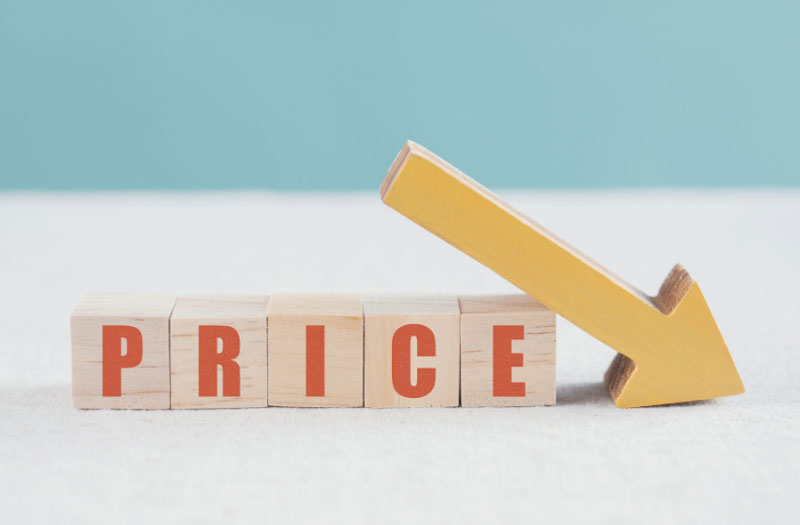The economy is in a bit of a mess at the moment and some of my clients are reporting a slight drop in enquiries. So when things slow down, do we offer sales and discounted prices?
With my marketing background, I see pricing differently to accountants and bookkeepers. For me, it’s about balancing your brand image with your finances.
If you are considering offering discounts to stimulate sales, please seek advice from your accountant, bookkeeper or business coach. In the meantime, here are my insights on the effects of price from a content marketing perspective.
Price = Quality
As consumers, we tend to evaluate quality by the price. So if we pay a higher price, we expect to receive better quality – regardless of whether it’s a product or a service.
In other words, if you start actively promoting discounted prices to generate more enquiries, you’ll risk undermining all of your efforts to build your reputation as quality provider. From there, you’ll begin to attract a different type of customer.
The take home: From a marketing perspective, if you need to reduce your prices, don’t promote it because it could devalue your reputation as a quality provider.
Raise Service Standards According to Customer Needs
When it comes to service, every business believes they are great. But good service is in the eyes of the customer. This is a really important lesson I learned in one of my first business to business sales roles.
I worked for a packaging company that made branded paper carry bags for retailers and it’s a business disaster if they run out of their bags. Unfortunately, there was a 2-3 month lag between ordering their bags and delivery.
When I first joined the company, my customers were very price conscious and always asked for a discount – until I started doing something different.
After every bag delivery, I’d ask them how long these bags would last. Then I’d follow up to check on usage with enough buffer to ensure their next order would be in-store before they ran out. That service was so valuable to my customers, they stopped asking for discounts and I began increasing their prices. Soon my customers generated greater profit margins for my employer than any other salesperson.
The take home: If you uncover what your customers and potential customers value most, price becomes irrelevant – regardless of the economy.
Become Elite
I have a few clients in the construction and renovation industry who prefer to do fewer projects per year so they can focus on high-end jobs. This focus is generating better financial returns and greater personal satisfaction. But they didn’t simply increase their prices. They invested in branding, content and advertising.
Everything they do oozes bespoke designs, leading edge materials and unique finishes. It’s taken each of them about a year to start seeing the real benefits in terms of the type of enquiries they receive. But in that time, they have carved a reputation of being the best-of-the-best so they don’t need to compete on price.
The take home: The current messy economy could be your time to reinvent your business to avoid competing on price by attracting different clients. However, you will need to be patient and invest in your marketing because it will take a while to generate enquiries from your new ideal customers.
Show Value by Including Freebies
Most businesses do extra things that we don’t tell our customers because to us they are small and part of what we do. But to our customers, they provide extra value or convenience that they will happily pay for.
For example, a plumber may check a customer’s home for leaking taps to ensure everything is taken care of in one visit. Or a web developer may test the speed of a prospective customer’s website to assess its functionality before suggesting changes.
The take home: Talk about the little things you do as a “free included service”. It could make the difference between getting the job or losing it to a lower price.
Know the Science Behind Discounts
You may be surprised to learn that marketers research what happens in consumers’ minds when prices change and discounts are offered. There are 2 standouts for me that apply to my clients – how you describe the discount and how you ask for payment.
#1: The research shows that if your product or service costs more than $100 (which is most of you), you will receive more sales if you tell people the $ value of the discount rather than the percentage discount. In other words, if you charge $1000, tell customers you are giving them a $200 discount rather than a 20% discount.
#2: Research also shows that charging people monthly rather than annually or in lump sum progress payments will make the investment seem smaller and may encourage them to buy more.
The take home: How you phrase any discounts you offer and structure your payment options will directly impact your quoting to purchase conversion rate.
We help you talk to your ideal customers
Businesses evolve and the economy fluctuates. But through it all, we stand by our clients – helping them speak to their ideal customers to ensure they attract and retain the people they most want to work with. Learn more about how we help Small & Medium Sized Businesses or contact Karen.






